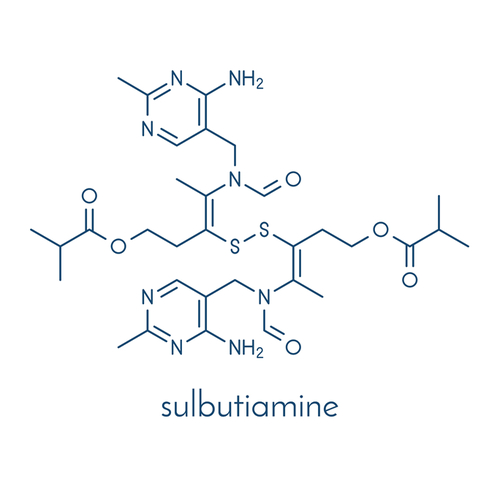
Sulbutiamine
Scientific names: Sulbutiamine
Alternate names: 2-Isobutyryl-thiamine Disulfide, Bis(2-(isobutyryloxy)ethyl-1-N-((4-amino-2-methylpyrimidin-5-yl)methyl)formamido-2-propene-1-yl)disulfide, Bisibuthiamine, Bisibutiamin, Bisibutiamine, BRN 0741531, EINECS 221-937-3, Sulbuthiamine, Sulbutiamin, Sulbutiamina, Sulbutiamine, Sulbutiaminum, UNII-42NCM1BW43, Vitaberin
Actions: Neurological
Background
Sulbutiamine is a man-made chemical similar to vitamin B1 (thiamine). Unlike vitamin B1, which dissolves in water, sulbutiamine dissolves in fats. Sulbutiamine is able to increase thiamine levels in the brain. It is thought to have mild stimulant effects.
Sulbutiamine is used for weakness, fatigue, to enhance athletic performance, and many other conditions, but there is no good scientific evidence to support these uses.
In December 2019, the U.S. Food and Drug Administration added sulbutiamine to the Dietary Supplement Ingredient Advisory List. The ingredients on this list might not be lawful to include in dietary supplements. For this reason, people may want to avoid using supplements containing sulbutiamine.
Sulbutiamine is used for weakness, fatigue, to enhance athletic performance, and many other conditions, but there is no good scientific evidence to support these uses.
In December 2019, the U.S. Food and Drug Administration added sulbutiamine to the Dietary Supplement Ingredient Advisory List. The ingredients on this list might not be lawful to include in dietary supplements. For this reason, people may want to avoid using supplements containing sulbutiamine.
Safety Safety definitions
When taken by mouth: Sulbutiamine is POSSIBLY SAFE when taken by mouth, short-term. A dose of 600 mg daily has been used safely for up to 2 months. A small number of people taking sulbutiamine have reported nausea, headache, tiredness, and inability to sleep.
There isn't enough reliable information to know if sulbutiamine is safe to use long-term.
Psychiatric disorders: People with certain psychiatric disorders, including bipolar disorder, may be more likely to abuse drugs. These individuals may be more likely to abuse sulbutiamine. Until more is known about sulbutiamine, people with psychiatric disorders should use sulbutiamine cautiously. These patients should not discontinue use of their prescribed treatments.
There isn't enough reliable information to know if sulbutiamine is safe to use long-term.
Special Precautions & Warnings:
Pregnancy and breast-feeding: There is not enough reliable information about the safety of taking sulbutiamine if you are pregnant or breast feeding. Stay on the safe side and avoid use.Psychiatric disorders: People with certain psychiatric disorders, including bipolar disorder, may be more likely to abuse drugs. These individuals may be more likely to abuse sulbutiamine. Until more is known about sulbutiamine, people with psychiatric disorders should use sulbutiamine cautiously. These patients should not discontinue use of their prescribed treatments.
Effectiveness
NatMed Pro rates effectiveness based on scientific evidence according to the following scale: Effective, Likely Effective, Possibly Effective, Possibly Ineffective, Likely Ineffective, Ineffective, and Insufficient Evidence to Rate.
Insufficient evidence Effectiveness definitions
- Nerve pain in people with diabetes (diabetic neuropathy). Early research shows that taking sulbutiamine (Arcalion) for 6 weeks doesn't reduce nerve pain in people with diabetes.
- Fatigue. Early research found that taking sulbutiamine daily for 15 days is linked with improved fatigue in people with an infection.
- Fatigue in people with multiple sclerosis (MS). Some people with MS who take sulbutiamine seem to feel less tired.
- Alzheimer disease.
- Athletic performance.
- Erectile dysfunction (ED).
- Memory.
- Weakness.
- Other conditions.
Dosing & administration
The appropriate dose of sulbutiamine depends on several factors such as the user's age, health, and several other conditions. At this time there is not enough scientific information to determine an appropriate range of doses for sulbutiamine (in children/in adults). Keep in mind that natural products are not always necessarily safe and dosages can be important. Be sure to follow relevant directions on product labels and consult your pharmacist or physician or other healthcare professional before using.
Interactions with pharmaceuticals
It is not known if Sulbutiamine interacts with any medicines. Before taking Sulbutiamine, talk with your healthcare professional if you take any medications.
Interactions with herbs & supplements
There are no known interactions with herbs and supplements.
Interactions with foods
There are no known interactions with foods.
Action
It is not fully understood how sulbutiamine works. However, it seems to have various effects on the brain that might improve memory and reduce feelings of weakness.
vital.ly has licensed monographs from TRC Healthcare.
This monograph was last reviewed on 22/02/2023 11:00:00 and last updated on 13/04/2015 18:37:36. Monographs are reviewed and/or updated multiple times per month and at least once per year.
Natural Medicines disclaims any responsibility related to medical consequences of using any medical product. Effort is made to ensure that the information contained in this monograph is accurate at the time it was published. Consumers and medical professionals who consult this monograph are cautioned that any medical or product related decision is the sole responsibility of the consumer and/or the health care professional. A legal License Agreement sets limitations on downloading, storing, or printing content from this Database. No reproduction of this monograph or any content from this Database is permitted without written permission from the publisher. It is unlawful to download, store, or distribute content from this site.




